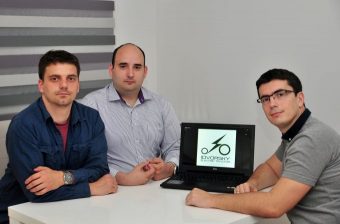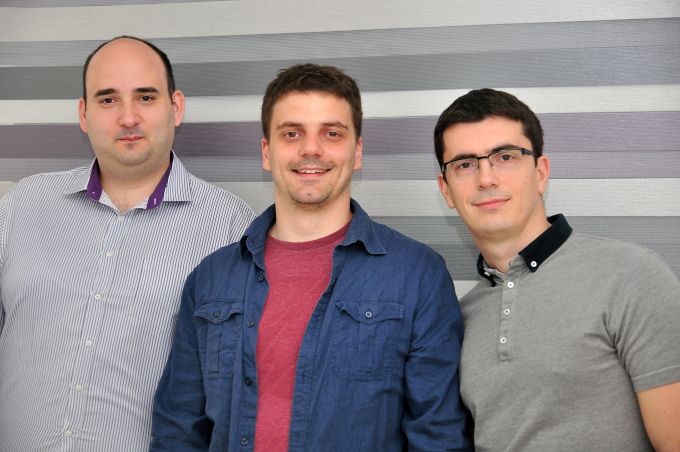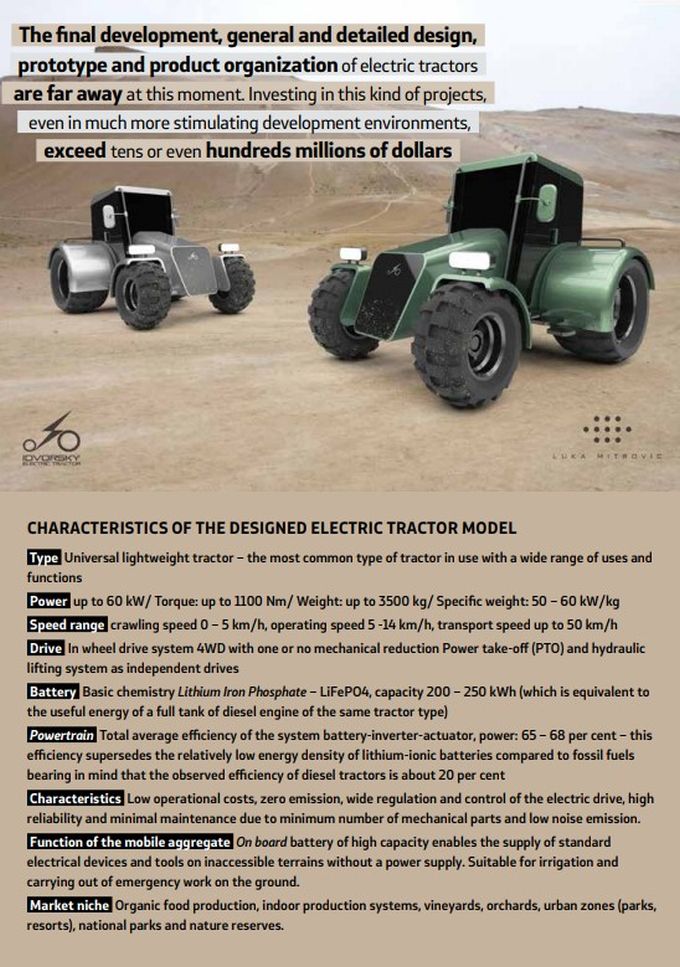
The road that Dalibor Marković, Nikola Popov and Ivan Jovanov have passed since the first mentioning of an electric tractor till today is pervaded through struggle, learning, research, satisfaction, enthusiasm and disappointments, delusions and failures, victories and defeats. Everything that one creative process of creating startup and innovation implies.
In the current decades, the world is becoming more and more aware of how important it is to reduce the emissions of harmful gases into the atmosphere, both in the field of industry and in the transportation. Also, there is an increase in the number of people who are turning to organic food production, without the use of pesticides and other chemicals, due to their health. But what’s the point of the most sophisticated organic seed and the minimal treatment of fruits and vegetables, when the soil is processed by agricultural machinery, which emits into the air, ground and water tons of exhaust gases, usually caused by impure oil and other fuels?
The road that Dalibor Marković, Nikola Popov and Ivan Jovanov have passed since the first mentioning of an electric tractor till today is pervaded through struggle, learning, research, satisfaction, enthusiasm and disappointments, delusions and failures, victories and defeats. Everything that one creative process of creating startup and innovation implies. In the current decades, the world is becoming more and more aware of how important it is to reduce the emissions of harmful gases into the atmosphere, both in the field of industry and in the transportation.
Also, there is an increase in the number of people who are turning to organic food production, without the use of pesticides and other chemicals, due to their health. But what’s the point of the most sophisticated organic seed and the minimal treatment of fruits and vegetables, when the soil is processed by agricultural machinery, which emits into the air, ground and water tons of exhaust gases, usually caused by impure oil and other fuels?
Three young men from Serbia – Dalibor Marković, Nikola Popov and Ivan Jovanov – found a way to tackle this problem. They launched a startup project “Idvorsky Electric” and presented a fully electric lightweight tractor on the international competition. Not only is the electric tractor energy efficient, but it is also completely ecological. In our bulletin ECOMOBILITY you have a unique opportunity to get to know the team named by the middle name and the birthplace of our world-renowned scientist Mihailo Idvorski Pupin.

HOW IT ALL STARTED
On one occasion, at the end of 2015, three friends and colleagues from Faculty of Electrical Engineering were lively discussing profession and the future. The spirit of entrepreneurship inherent in their generation and the common desire to engage in innovation, inspired their conversation. The technological world, and especially a part of that world that is close to them, was full of exciting events and novelties. Display of the future that the new technology brings on a daily basis was no longer based only on the picture of the supercomputer, the Internet, smartphones, networked devices, and virtual reality anymore. Burning need for clean energy, as well as the awareness about sustainable development, have led to a large specter of innovations their branch – the electric power industry.They were especially fascinated by the electric vehicles development trend, as well as the main protagonist of this philosophy, Elon Musk and the achievements of his company “Tesla”.
– Nikola, the newest doctor of science from our company, mentioned during the discussion that frequent problems with old father’s tractor on the family estate prompted him to think about the electric version of a light tractor. Soon, his idea got us completely occupied, and wider audience found it very interesting – Ivan Jovanov, one of the three minds of this project, told us. And with their idea and just a few months of development, as the only team from the region called “Idvorsky Electric”, they finished in the final of the eminent startup competition, at the Stanford University, as part of a global entrepreneurial summit, which was personally hosted and supported by the then US President, Barack Obama. After this great experience and return from San Francisco, we quickly concluded that it is necessary to “pivot” around the original idea that we had taken to America, whose concept was to electrify the existing, old tractors. After deeper acquaintance with this multidisciplinary issue, we realized that, although it is technically possible to process the existing diesel tractors into electric, this type of end product would not achieve economic sustainability nor comparable functional capacity of a standard tractor – said Ivan and continued:
– A modern market requires that the goal of any innovation or technology transfer must be improved product functionality or some features, such as the impact on the environment, and clear economic viability. Electric cars, as pioneers of vehicle electrification, successfully acquired customers. Even those early, expensive versions, although highly unreliable and with the pronounced feature of range anxiety, found their wealthy customers and eco enthusiasts who recognized electric cars as the herald of a sustainable future or a kind of a status symbol. On the other side, the future user of an electric tractor, or any other operation tool, must have undoubtedly economic benefits as the basic condition for considering the purchase and using a product. Of course, there should be no doubts that among farmers there are elitists and those, who are early adopters of changes, but it certainly should not rely on it during positioning the electric tractor on the market.
We were particularly fascinated by Elon Musk and the achievements of his “Tesla” company
The whole idea of the construction of this tractor is based on the technology wave advanced for the development of electric cars. However, this variation of the topic of electric vehicles – as well as others that have already come to life along with cars – like electric trucks and buses – requires a complete development and custom design of the new powertrain technology for the needs of a particular vehicle.
This challenge would not only involve the engineering of the electric tractor itself, but also a creation review of the entire concept of using this tractor (infrastructure of charging, maintenance, business model, and economics of use, etc.), considering that similar products do not exist on the market yet.
– With our, almost tremendous effort, as well as advice of good people of similar enthusiasm, professionals in the field of agriculture, mechanical engineering and technology, we have succeeded in setting the hypothesis of a sustainable model of an electric tractor, after considerable time spent on researching and working on basic engineering – explains Ivan.
Detailed modeling and complete analysis of the technical and economic sustainability of the concept have become the task of a serious feasibility study. The proportions and width of the challenges of such a project outweigh the power of the three enthusiasts. Only a feasibility study requires a dedicated team of experts of various specialties, organization and means for its development, which are estimated at around 120,000 euros.
– The final development, general and detailed design, prototype and product organization of electric tractors are far away at this moment, considering that investments in this kind of projects, even in much more stimulating development environments, exceed tens or even hundreds millions of dollars – Ivan is real.

The further course of this project is critical and very uncertain, but the Idvorsky team never loses hope.
– Mоney and other social conditions have to be provided, to meet materialization of this project in Serbia. Our contribution to launching the spark is certainly not sufficient. However, it has generated valuable knowledge and experience which belongs to the future so that our efforts are not in vain.
Adapted by: Tamara Zjačić and Vera Rakić
This story first appeared in our bulletin ECOMOBILITY that was published in July, 2017.
